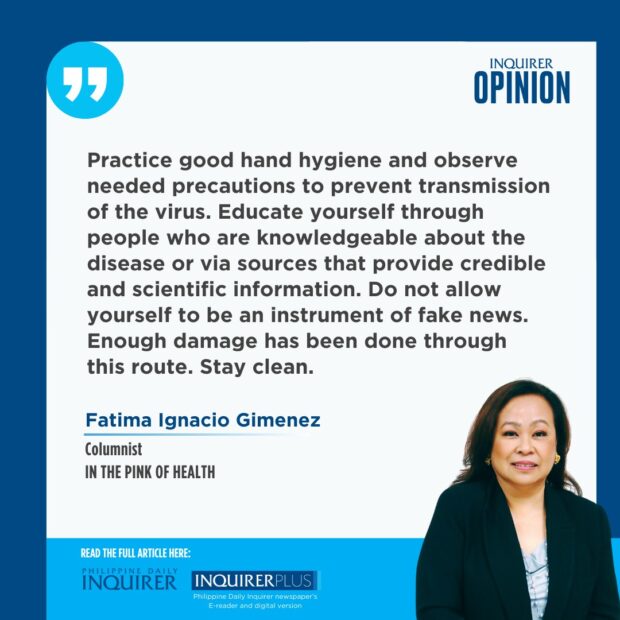Virus on the sly

Doctor, my husband is worried about monkeypox (mpox) affecting our children. Is there a vaccine available?“ I replied and said, ”Currently there is none in the Philippines and there is no reason to panic.”
“It’s quite unusual to have such a florid distribution of lesions described as being painful rather than itchy. The prominent lymphadenopathy, and the location, makes me inclined to consider mpox rather than just a severe case of chicken pox.” Hearing this from a colleague brought back a two-decade-old memory of a cousin, then in his early 20s, who contracted varicella. His face and entire body were severely affected and there was no facility willing to accept him except for one government hospital in Quezon City. He was lucky to have survived.
Any physician is well aware that for an individual with fever and rash, there are multiple conditions to consider. A history of exposure in the community from infected individuals or animals, travel to endemic areas, past and recent vaccination, past infection, and the existence of co-morbid conditions that may place one at a higher risk of contracting a disease, can all play a role in narrowing down the differentials. A thorough physical examination may give a clue but becomes more challenging in the face of nonspecific signs and symptoms. For the varicella and mpox which are unrelated viruses, the lesions are similar in appearance, necessitating diagnostics to confirm the diagnosis. To differentiate, a polymerase chain reaction or PCR of an appropriate clinical specimen is needed.
Article continues after this advertisementIn recent weeks, the antenna has been raised because of the upsurge of cases in the Democratic Republic of Congo and certain countries in Africa prompting the World Health Organization to declare mpox once again as a public health emergency of international concern. Last July 2022, there was a global multicountry outbreak which was eventually declared over in May of 2023. The emergence of new strains and confirmation of cases in countries that never had mpox and with no history of travel from endemic countries is a cause for alarm and has raised additional queries on other possibilities on who is most at risk and other modes by which the virus can be acquired.
By way of introduction, the monkeypox virus was first isolated from monkeys and belongs to the same genus as the variola virus causing smallpox and the vaccinia virus, which is the one used in smallpox vaccines.
How is mpox transmitted? Animal-to-human and human-to-human transmission may occur. The former from bites or contact with an infected animal’s bodily fluids and the latter, from direct intimate and personal contact with an infected individual’s lesions and bodily fluids, through respiratory secretions from prolonged face-to-face contact, and through materials that may contain the virus and comes into contact with the recipient’s mucous membranes or broken skin. Current literature includes two case reports via needlestick injuries of two health-care workers who were caring for mpox patients, and of cases traced to one tattoo parlor in Spain, wherein 21 customers out of 58 fell ill. Supplies used for tattooing or piercing tested positive for the monkeypox virus. There have also been reports of perinatal and nosocomial transmission. This only means that anyone can be susceptible to the disease and is not limited to sexual exposure.
Article continues after this advertisementWhat are the signs and symptoms? At the onset, one may experience fever, headache, malaise, or fatigue, followed by a vesicular rash that has been described as painful, progresses through different stages, and may involve any part of the body. Individuals in the 2022 outbreak frequently presented with lesions in the oral, perioral, and anogenital regions.
How long is a patient contagious? A person is deemed contagious from the time he becomes symptomatic, up until all the lesions have healed, as evidenced by crusting or scab formation and the appearance of new skin tissue over the affected areas. This may take two to four weeks and is a determinant of the length of isolation and contact precautions.
Is there a cure? In general, the disease is mild and self-limiting but may be complicated especially in those who are immunocompromised, warranting the use of an antiviral and in the presence of secondary infection, antibacterial medication.
Is there prolonged immunity? Re-infection is possible and from available data, the course in such an event is shorter. Receipt of smallpox vaccination has also been associated with milder illness.
Currently, there are no available antivirals or vaccines in the country. The best way would be to immediately seek consult and isolate, on the background of a high probability of having the infection, or one has likely been exposed to someone with an infection.
Practice good hand hygiene and observe needed precautions to prevent transmission of the virus. Educate yourself through people who are knowledgeable about the disease or via sources that provide credible and scientific information. Do not allow yourself to be an instrument of fake news. Enough damage has been done through this route.
Stay clean.
timgim_67@yahoo.com
















